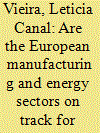| Srl | Item |
| 1 |
ID:
179734


|
|
|
|
|
| Summary/Abstract |
The European Green Deal has established a 2050 net-zero emissions target to tackle climate change. The manufacturing and energy sectors account for at least 40% of European emissions and are central in the transition to a low-carbon economy. Thus, devising suitable strategies for reaching net-zero emissions requires a comprehensive analysis of emissions reductions achieved by the two sectors. This paper has a two-fold aim: firstly, to empirically analyse European energy and manufacturing facilities’ abatement results; secondly, to expose whether the two sectors are on track to achieve net-zero emissions by 2050. We used European Union Emissions Trading System data from 2005 to 2017 from France, Germany, Italy, Spain, and the United Kingdom to analyse the homogeneity of mitigation performances and the distribution of emissions among installations. The results indicate that a large share of installations have not decreased emissions yet, although there is substantial variety in units' contribution to total carbon releases. A smaller bundle of units (from 13 to 23%) containing super-polluters is responsible for up to 95% of emissions. The findings highlight that achieving net-zero emissions by 2050 will require additional policies that are tailored to super-polluters and also support installations that have not started their decarbonisation pathway.
|
|
|
|
|
|
|
|
|
|
|
|
|
|
|
|
| 2 |
ID:
166971


|
|
|
|
|
| Summary/Abstract |
Meeting climate goals is a particular challenge for countries that combine extensive use of coal as a fuel for power generation with a significant history of coal mining. We argue that these countries are prone to institutional carbon lock-in processes that significantly affect the phase-out of the use of coal. We use the analytical framework of Varieties of Capitalism to compare degrees of carbon lock-in in Coordinated Market Economies (CMEs) with Liberal Market Economies (LMEs). In CMEs “strategic interaction”, “employment protection” and “government ownership” translate into protection of uncompetitive domestic coal activities and assets through (cross) subsidies and veto play. In LMEs the use of coal will be more dependent upon its market price in the international energy market. Through a qualitative comparison of the development of coal-mining and coal-fired electricity generation in three CMEs (Germany, Spain, Poland) and one LME (the UK) over the period between 1990 and 2017 we show that the UK's liberal market economy facilitated a relatively swift phasing out of coal mining and the use of coal, compared to a much more reluctant transition in the other three countries.
|
|
|
|
|
|
|
|
|
|
|
|
|
|
|
|